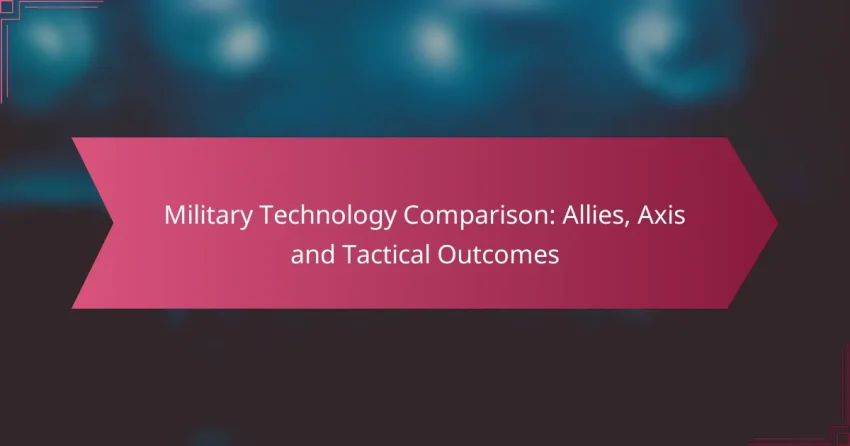In modern warfare, tank strategies revolve around three critical components: mobility, firepower, and coordination. Optimizing mobility allows tanks to traverse diverse terrains swiftly, while robust firepower enhances their capability to engage enemy forces effectively. Additionally, effective coordination among tank units is essential for maximizing operational efficiency and ensuring successful combat outcomes. What Are Effective Tank…
Author: Harold Whitaker
Propaganda: Influence, Techniques and Public Perception
Propaganda plays a crucial role in influencing public opinion by shaping beliefs and attitudes through various persuasive techniques. By leveraging emotional appeals and selective information, it aims to sway individuals towards specific viewpoints or actions. The effectiveness of these methods often hinges on psychological triggers, while cultural context and societal values significantly impact how propaganda…
Military Technology Comparison: Allies, Axis and Tactical Outcomes
The comparison of military technologies between the Allies and Axis Powers reveals how these innovations shaped tactical outcomes in warfare. The Allies leveraged advancements such as aircraft carriers and cyber warfare systems, while the Axis Powers relied on technologies like U-boats and the Enigma machine. These technological developments not only enhanced operational capabilities but also…
WWII Military Technology: Legacy, Modern Warfare and Strategic Evolution
World War II marked a pivotal moment in military technology, introducing groundbreaking advancements in weaponry, communication systems, and strategic frameworks. These innovations not only transformed combat effectiveness during the war but also established the foundation for modern military operations and defense capabilities. The legacy of WWII technology continues to influence contemporary warfare, shaping the evolution…
Cryptography: Military Operations, Communication Security and Intelligence
Cryptography plays a vital role in military operations by securing communications and safeguarding sensitive information from adversaries. Advanced techniques ensure the confidentiality, integrity, and authenticity of data, which are essential in defense scenarios. By employing secure voice systems, encrypted messaging, and strict protocols, military communication is fortified against interception and unauthorized access. What Are the…
WWII Psychological Warfare: Lessons for Modern Conflicts
World War II marked a pivotal moment in the evolution of psychological warfare, showcasing how the manipulation of public perception and morale could alter military outcomes. The techniques developed during this era, such as deception strategies and media manipulation, continue to inform modern military and political strategies aimed at influencing both enemy behavior and public…
Radar Technology: Development, Applications and Tactical Impact
Radar technology plays a crucial role in numerous sectors, including air traffic control, weather monitoring, and military surveillance, by utilizing radio waves to detect and track objects. Its ability to provide critical data enhances safety, security, and operational efficiency across various applications, from automotive safety systems to maritime navigation. What Are the Key Applications of…
Psychological Warfare: Allies and Axis Comparison
During World War II, both the Allies and Axis powers utilized psychological warfare as a critical component of their military strategies. The Allies focused on propaganda and deception to weaken enemy morale, while the Axis employed fear and disinformation to manipulate public perception. Each side’s tactics aimed to destabilize the opposition and strengthen their own…
Logistics: Influence on Major WWII Battle Outcomes
Logistics was a decisive factor in the outcomes of major battles during World War II, shaping troop movements and supply chains that directly impacted military effectiveness. From the critical supply failures at Stalingrad to the successful logistical planning of the D-Day invasion, the ability to manage resources efficiently often determined victory or defeat. In the…
Aircraft Carriers: Strategic Importance, Tactical Advantages and Historical Impact
Aircraft carriers are essential components of modern naval forces, acting as floating military bases that enhance a nation’s strategic and tactical capabilities. Their ability to project power and maintain a global presence allows for rapid deployment of air assets and effective responses to threats. Historically, these vessels have transformed naval warfare by enabling operations over…









